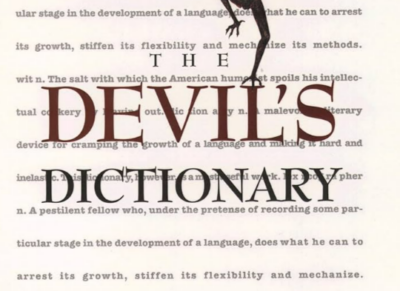128 Results in the "Philosophy" category
Biography & Memoir (434)
Books Like (8)
Business & Finance (26)
Children’s Fiction (176)
Dystopian (16)
Education & Learning (9)
Fantasy (1144)
fashion (1)
Fiction (4228)
Health & Wellness (21)
Historical Fiction (504)
Horror (159)
Literary Fiction (747)
Non-Fiction (1175)
Novel (229)
Others (82)
Poetry (208)
Politics & History (125)
Posts (62)
Psychology (46)
Religion & Spirituality (1)
Romance Novel (525)
Science & Technology (82)
Science Fiction (204)
Self-Help & Personal Development (99)
Thriller / Mystery (776)
Travel & Adventure (2)
True Crime (55)
view (96)
Young Adult (214)
-
Chapter
Chapter F
 Chapter F begins with Bierce’s playful critique of the mythical Fairy, portrayed not as a symbol of innocence but as a mischievous relic of outdated belief systems. He recalls how laws once protected these fictional beings, illustrating the absurd lengths to which societies have gone to defend the imaginary. By invoking their reported appearances in the 19th century, Bierce highlights the human tendency to embrace superstition, even when faced with advancing reason. His depiction draws attention to how…
Chapter F begins with Bierce’s playful critique of the mythical Fairy, portrayed not as a symbol of innocence but as a mischievous relic of outdated belief systems. He recalls how laws once protected these fictional beings, illustrating the absurd lengths to which societies have gone to defend the imaginary. By invoking their reported appearances in the 19th century, Bierce highlights the human tendency to embrace superstition, even when faced with advancing reason. His depiction draws attention to how…-
82.1 K • Ongoing
-
-
Chapter
Chapter E
 Chapter E opens with a humorous yet insightful look at Eating, defined by Bierce as the successful coordination of many bodily functions, distinguishing between mere consumption and the true enjoyment of a meal. This contrast highlights how the physical act of nourishment often lacks the pleasure associated with fine dining. Through a witty anecdote about the gastronome Brillat-Savarin, Bierce sets the tone for his exploration of ordinary acts, revealing their deeper cultural and emotional layers. The…
Chapter E opens with a humorous yet insightful look at Eating, defined by Bierce as the successful coordination of many bodily functions, distinguishing between mere consumption and the true enjoyment of a meal. This contrast highlights how the physical act of nourishment often lacks the pleasure associated with fine dining. Through a witty anecdote about the gastronome Brillat-Savarin, Bierce sets the tone for his exploration of ordinary acts, revealing their deeper cultural and emotional layers. The…-
82.1 K • Ongoing
-
-
Chapter
Chapter D
 Chapter D sets the tone with the redefinition of Damn, a word that Bierce cleverly allows to shift in meaning depending on who defines it—be it theologian, philosopher, or common man. This ambiguity allows him to satirize how language, especially in moral contexts, is shaped more by perception than principle. Bierce uses the term to mock not just religious doctrine, but the human tendency to tailor judgment for convenience. Through this lens, condemnation becomes a flexible tool used selectively. His wit…
Chapter D sets the tone with the redefinition of Damn, a word that Bierce cleverly allows to shift in meaning depending on who defines it—be it theologian, philosopher, or common man. This ambiguity allows him to satirize how language, especially in moral contexts, is shaped more by perception than principle. Bierce uses the term to mock not just religious doctrine, but the human tendency to tailor judgment for convenience. Through this lens, condemnation becomes a flexible tool used selectively. His wit…-
82.1 K • Ongoing
-
-
Chapter
Chapter C
 Chapter C opens with Bierce’s knack for blending satire and sharp observation, starting with Caaba, a stone linked to Abraham that embodies religious ambiguity and human folly. By connecting it to the story of Babel, Bierce hints that divine worship often conceals confusion and vanity, turning sacred symbols into reminders of human error. This sets the stage for a series of definitions that unravel accepted meanings to reveal underlying absurdities in culture and belief. His humor highlights how even…
Chapter C opens with Bierce’s knack for blending satire and sharp observation, starting with Caaba, a stone linked to Abraham that embodies religious ambiguity and human folly. By connecting it to the story of Babel, Bierce hints that divine worship often conceals confusion and vanity, turning sacred symbols into reminders of human error. This sets the stage for a series of definitions that unravel accepted meanings to reveal underlying absurdities in culture and belief. His humor highlights how even…-
82.1 K • Ongoing
-
-
Chapter
Chapter B
 Chapter B begins with a look at Baal, a deity once worshipped across various ancient civilizations, often symbolizing power and natural forces. Bierce does not simply define Baal as a figure of mythology; he connects it to the confusion born of humanity’s attempts to build structures—literal and ideological—that reach too far. By referencing the story of Babel, he draws a line between the ambition to touch the divine and the chaos that follows. The implication is that veneration often disguises…
Chapter B begins with a look at Baal, a deity once worshipped across various ancient civilizations, often symbolizing power and natural forces. Bierce does not simply define Baal as a figure of mythology; he connects it to the confusion born of humanity’s attempts to build structures—literal and ideological—that reach too far. By referencing the story of Babel, he draws a line between the ambition to touch the divine and the chaos that follows. The implication is that veneration often disguises…-
82.1 K • Ongoing
-
-
Chapter
Chapter A
 Chapter A unfolds with Bierce’s familiar edge, starting with Abasement, which he defines not as humility, but as calculated submission—particularly in contexts of employment or authority. Rather than depicting it as a virtue, he recasts it as a social strategy, where people learn to shrink themselves in order to survive power dynamics. The sharpness of the definition cuts through the illusion of dignity in hierarchy. For Bierce, the act of lowering oneself is not noble, but necessary in systems built…
Chapter A unfolds with Bierce’s familiar edge, starting with Abasement, which he defines not as humility, but as calculated submission—particularly in contexts of employment or authority. Rather than depicting it as a virtue, he recasts it as a social strategy, where people learn to shrink themselves in order to survive power dynamics. The sharpness of the definition cuts through the illusion of dignity in hierarchy. For Bierce, the act of lowering oneself is not noble, but necessary in systems built…-
82.1 K • Ongoing
-
-
Chapter
Chapter 9: Nowhere and Nothing
 Chapter 9: Nowhere and Nothing, In a scene from the Pooh books, Pooh and Christopher Robin are on a journey to nowhere. When Christopher asks Pooh what he likes best, Pooh responds with his love for eating, but Christopher shares that his favorite activity is doing nothing. He describes doing nothing as “going along, listening to all the things you can’t hear, and not bothering,” which is a simple but profound way to express the Taoist principle of embracing stillness and simplicity in life. This…
Chapter 9: Nowhere and Nothing, In a scene from the Pooh books, Pooh and Christopher Robin are on a journey to nowhere. When Christopher asks Pooh what he likes best, Pooh responds with his love for eating, but Christopher shares that his favorite activity is doing nothing. He describes doing nothing as “going along, listening to all the things you can’t hear, and not bothering,” which is a simple but profound way to express the Taoist principle of embracing stillness and simplicity in life. This…-
68.0 K • Ongoing
-
-
 Chapter 9 - "Climbers" in England draws attention to a curious spectacle—the tireless efforts of certain Americans to enter the ranks of English high society. The fascination is mutual, yet often tinged with confusion and condescension. While Americans arrive with enthusiasm, expecting glamour and influence, they are met with cold scrutiny and a subtle caste system rooted more in tradition than merit. The so-called “Little Englander” mindset, with its quiet pride and national rigidity, resists…
Chapter 9 - "Climbers" in England draws attention to a curious spectacle—the tireless efforts of certain Americans to enter the ranks of English high society. The fascination is mutual, yet often tinged with confusion and condescension. While Americans arrive with enthusiasm, expecting glamour and influence, they are met with cold scrutiny and a subtle caste system rooted more in tradition than merit. The so-called “Little Englander” mindset, with its quiet pride and national rigidity, resists…-
151.7 K • Ongoing
-
-
Chapter
Chapter 8: That Sort of Bear
 Chapter 8: That Sort of Bear, Hoff tells Pooh about Beethoven's Ninth Symphony, and Pooh excitedly mentions his favorite part, "Sing Ho! For a Bear!" However, Pooh soon realizes that this isn't a part of Beethoven's music but a song he made up himself. This chapter centers on the idea of "enjoying life and being special." In the Pooh books, Rabbit leads Pooh and Piglet on an adventure, assuring them that they both are essential to the success of the journey, even though they doubt their own worth. Rabbit…
Chapter 8: That Sort of Bear, Hoff tells Pooh about Beethoven's Ninth Symphony, and Pooh excitedly mentions his favorite part, "Sing Ho! For a Bear!" However, Pooh soon realizes that this isn't a part of Beethoven's music but a song he made up himself. This chapter centers on the idea of "enjoying life and being special." In the Pooh books, Rabbit leads Pooh and Piglet on an adventure, assuring them that they both are essential to the success of the journey, even though they doubt their own worth. Rabbit…-
68.0 K • Ongoing
-
-
Chapter
Chapter 8 – Idling in Mid-Ocean
 Chapter 8 - Idling in Mid-Ocean offers more than a scenic voyage; it becomes a slow exhale from the pressures of the structured world. The open sea surrounds the traveler with silence and space, and in that vastness, the senses sharpen while the mind settles. There are no doors to knock on, no errands to run, no meetings to attend. This enforced stillness, rather than breeding impatience, fosters a rare kind of peace. Time stretches like the horizon, not bound by clocks but by meals, sunsets, and the soft…
Chapter 8 - Idling in Mid-Ocean offers more than a scenic voyage; it becomes a slow exhale from the pressures of the structured world. The open sea surrounds the traveler with silence and space, and in that vastness, the senses sharpen while the mind settles. There are no doors to knock on, no errands to run, no meetings to attend. This enforced stillness, rather than breeding impatience, fosters a rare kind of peace. Time stretches like the horizon, not bound by clocks but by meals, sunsets, and the soft…-
151.7 K • Ongoing
-
- Previous 1 … 7 8 9 … 13 Next
